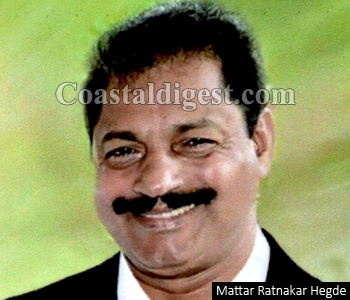Udupi, Aug 10: A day after a prominent Bunts organisation slammed him for reportedly deciding to represent the three accused in Saudi businessman Bhaskar Shetty murder case, BJP leader and advocate Mattar Ratnakar Hegde on Wednesday said that he was yet to take a decision on the matter.

Rajeshwari, Navneet and Niranjan Bhat
Mr Hegde, who is the president of Udupi district committee of the saffron party, hesitated to respond to media persons' question whether he had already taken up the case on behalf Shetty's wife Rajeshwari, son Navneeth Shetty and astrologer Niranjan Bhat, the three prime accused.
“This is BJP office. Not a right place to talk about a case which has nothing to do with the party,” said Mr Hegde, when media persons continued ask questions regarding Bhaskar Shetty murder during a press meet at the party office, here.

He added that the bail application in favour of the accused is yet to be moved and once it is done, the accused counsel's name would be made public. The advocate said that he would not prefer to comment as the matter is sub-judice.
The rumours spreading against him in social networking sites are tackled through the messages, he said, adding that he would prefer to remain silent and everything will be revealed in the course of time.
It is worth mentioning here that a meeting organised by the Udupi Taluk unit of Buntara Sangha on Tuesday had resolved to urge advocate Hegde, who is also from Bunt community to give up the case of the accused. A large number of members of the Bunts community had attended the meeting held at the Ammanni Ramanna Shetty Hall complex, here.
More people involved?
Indrali Jayakar Shetty, president of the Udupi Taluk Bunts Samaj, meanwhile said that the murder case, which was taking a new turn daily, was a well-thought conspiracy. It was not possible for just a mother and son to kill a person weighing about 90 kilograms.
He said that according to some media reports, after Bhaskar Shetty was bludgeoned to death at his house at Hayagreeva Nagar here on July 28, the body was taken in the boot of a car by the mother-son team to Nandalike village, where it was burnt in the Yagna Kund room in a house belonging to archak Niranjan Bhat. The ashes were later dispersed in a nearby rivulet. This showed that it was a planned act.
If Ms. Gulabi Shetty had not lodged a complaint, the case would have been closed. The way the case was being handled left a lot to be desired and the accused were being given “royal treatment”.
The conspiracy should be unravelled and the guilty punished so that Ms. Gulabi Shetty, who was shocked at her son's death, got some solace, he said.
Background
Bhaskar Shetty went missing on July 28. His mother Gulabi Shetty lodged a missing complaint at the Manipal Police Station on July 29. Shetty had strained relations with his wife Rajeshwari (46) and son Navneet (20) over property issues.
Things took a dramatic turn, when Bhaskar Shetty's relative Joggu Shetty said that he suspected Rajeshwari, Navneet and Niranjan to be involved in Bhaskar Shetty's murder.
The police arrested Rajeshwari and Navneet on the charge of murdering Bhaskar Shetty and trying to destroy evidence. Bhat, who was close to Rajeshwari and Navneet, was also arrested later.
Also Read:
Saudi bizman murder: Bhat swallows diamond ring to avoid arrest
Saudi bizman Bhaskar Shetty murdered by wife, son in Udupi with priest's help
Days after assault by wife and son, Udupi hotelier Bhaskar Shetty goes missing







Comments
Mattar Rathnakar Hegde is responsible person from BJP and Bunt community.
Both wife and son of Mr. Bhaskar Shetty confessed the crime. Hence, on moral ground he should refuse to take this case. We respect Hegde for if he does so.
Adv M R Shetty has all the right to take up the case. It is part of his profession.
Headline is sensationalised to malign BJP. No media gave headline that Indian Muslim defends Ajmal Kasab when advocated \Ajmal\" Kazmi took up the Mumbai terror attack case."
Targeting a lawyer just because he took up a case is a dangerous development. Does Indian law deny opportunity for the accused to prove their innocence? Besides nothing is confirmed yet here. The case is built on mere allegations and suspicions.
Veren langotty came.
kid, how could u do this that too to your own father?
Whoever involved in his murder should be punished severely and show no mercy at all.....they should suffer for it....
criminals must be punished.
without pre-plan these people cant execute such big crime so easily.
born killers!!!!
Again it's proved. CD does not miss any chance to indict BJP directly or indirectly. #presstitues
The true face of BJP's hindutva unveiled again. they protest if a criminal was murdered by a muslims and defend the killers if they were hindus.
Add new comment